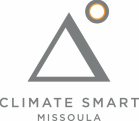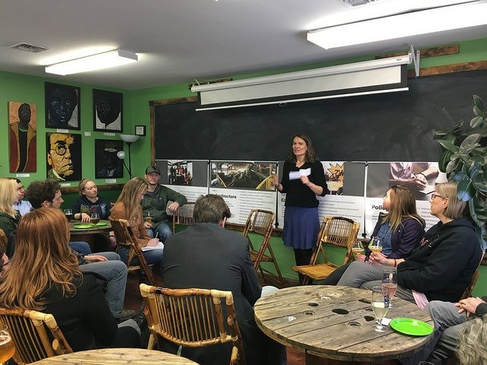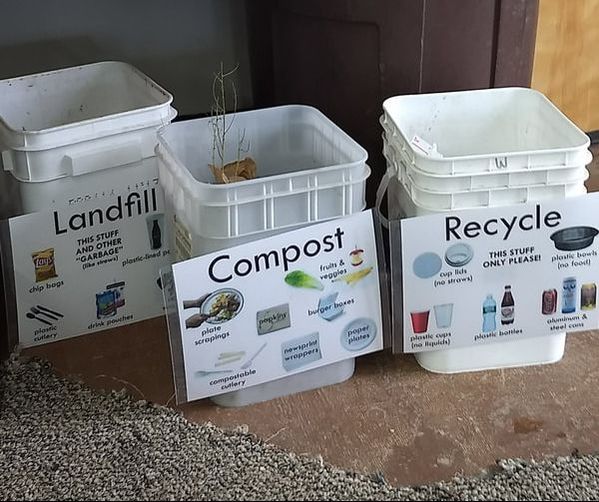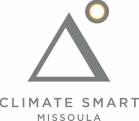|
By Sydney Lang, Climate Smart Missoula Intern Our March meetup was all about zero waste! We had great discussions on individual contributions and community collaboration to reduce reuse and recycle materials. With the room jam packed, it was evident Missoula has strong momentum to reduce waste, which was encouraging and inspiring. The meeting kicked off with an overview of Missoula’s ZERO by FIFTY plan from Chase Jones, the City of Missoula Energy Conservation and Climate Action Coordinator. ZERO by FIFTY is an effort to reduce landfill waste 90 percent by 2050 and the four pathways and strategies that help achieve it - access, infrastructure, education and policy. So what’s the significance of the four pathways and what are some initiatives already in motion? Access involves a push for universal recycling and compost collection services, zero waste stations in public spaces, and generally making waste reduction easy and accessible for all Missoulians. Recognizing that Missoula recovers only 20 percent of total waste, it was encouraging to hear from successful local initiatives that will improve our waste recovery rate. Logjam Presents - Going Green initiative partnered with the City of Missoula's ZERO by FIFTY, and Missoula Compost Collection, is expanding access for reducing and recycling waste at the Top Hat Lounge, Wilma and Kettlehouse Amphitheater. They’re doing smart things like teaming up with Klean Kanteen to create a line of reusable cups and water bottles to reduce the amount of single-use container waste, and implementing a compost program which will eliminate all plastic single-use cups. Additionally, all single-use cups, straws and water bottles will be replaced with 100 percent compostable products. A representative from Logjam announced at the meetup that they have already saved 95 percent of their cups from the landfill! They even allow event attendees to come in with their own reusable cups. Entertainment venues are such a great space to make a difference. Everyone loves to come to a concert and have a drink, so it is a great platform to take advantage of sustainable opportunities.
Education is fundamentally about changing the way we think about things and is particularly impactful when starting with kids. Home ReSource has an effort to educate the community and change the culture around waste by partnering with Missoula County Public Schools. Their ZWAP program teaches 5th graders lessons about zero waste, helping kids understand the life cycle of waste, where it comes from, how we use it and how much ends up in the landfill. The students quickly gain perspective and brainstorm ways they can divert from the landfill through interactive presentations, classroom exercises and creative thinking. 5th graders realize that almost everything can be diverted from the trash, their perspective is changed and hopefully become ambassadors of zero waste throughout life. While zero waste is challenging, this program has the ability to change the culture around waste by starting with our future leaders.
As one of the 5th grade teachers at Franklin Elementary School said at the meetup, “the flipside of challenge is opportunity.” Her classroom is absolutely running with the opportunity, using cloth towels instead of paper, real silverware for snacks and more. It was amusing hearing the teacher explain that custodians comes into her classroom and chuckle because they dump the trash only once a week. I didn’t realize until much later than 5th grade what actually happens when I put something in the trash, so I think these lessons are phenomenal. Policy is a big one, and a lot of times when we hear the word policy, our minds skip right to government, the big towering beast that can sometimes feel very out of our control. Home ReSource reminded the audience that there are many spheres of influence into local and national government. Missoula is exploring a zero waste ordinance and working to change policy around construction waste. The audience also suggested some policy ideas, such as creating a ban on single use disposables and extending producer responsibility. For example, a company might send you an item, all wrapped up and in a box. When you get this package the customer would take their item out and then send the box and packaging back to the company to be reused. We wrapped up our meetup with a discussion on ways individuals can reduce waste, brainstorming different methods every person had the power to implement. Some neighbors discussed sharing trash cans and others expressed the impact of buying foods in bulk. Parents discussed simple solutions like buying glass containers for packing their kids’ lunches instead of using plastic bags. One audience member explained her effort to remain aware of the waste cycle everyday. Everytime she throws away any trash she imagines it following her for the rest of the day, reminding her that just because trash is out of site doesnt mean its vanished. This was a powerful idea. It is also a terrifying idea, and one that could potentially weigh you down, but on the flipside, it is a reminder that our individual choices do matter. Home ReSource closed the event with a wise words. So far, they’ve diverted 1.8 million pounds from the landfill. One of their mottos is “you can’t recycle your way to zero waste”: it takes changing our culture’s relationship with things. They inspire us all to work hard to reuse items and channel energy into creative ways to reduce waste.
2 Comments
Leave a Reply. |
AuthorsAbby Huseth Archives
July 2024
Categories
All
|



 RSS Feed
RSS Feed


